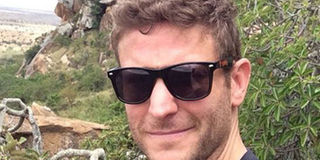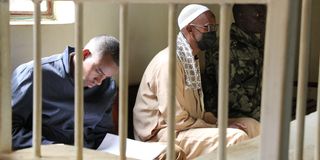
I-DEV chief executive Jason Spindler is among people killed in the Dusit hotel attack. PHOTO | COURTESY
“Losing Jason is a wound that never heals. I wake up each day to a silence that shouldn’t be — his voice and laughter gone, his energy stilled. Our family is fractured beyond repair.”
These are the words of Mr Joseph Spindler describing the impact of the death of his firstborn son Jason Spindler who was killed in Nairobi’s DusitD2 terrorist attack on January 15, 2019.
He adds: “My wife and I will never see him chase his next dream maybe politics as he had planned or start a family of his own.”
In his victim impact statement submitted to the Kahawa Law Courts, Mr Spindler recalled how Jason died at 40 in a country where he enjoyed working. He described his late son as a brilliant, kind and determined man who was stolen from the family by the actions of a suicide bomber whose ideology was fuelled by hate.

Hussein Mohamed Abdille Ali and Mohamed Abdi Ali have been sentenced to 30 years in jail for facilitating the 2019 Dusit attack, which left 21 people dead.
“Your Honour, I’m not here for revenge but for justice. Under Kenyan law, those who collaborated with terrorists must face the full weight of justice. Jason was a survivor, a doer and a visionary. He deserved a future and not a grave marked by the shrapnel from a terrorist’s suicide vest,” he said.
The statement was presented on June 19, 2025 ahead of the sentencing of Mohamed Abdi Ali and Hussein Mohamed Abdille Ali by High Court Judge Diana Kavedza.
The two men were linked to the January 15, 2019 terrorist attack at the DusitD2 Hotel Complex in Nairobi which claimed the lives of 21 people, including foreign nationals, and left several others with life-threatening injuries.
They were each sentenced to 30 years in prison after the court concluded that they supported the attackers by sending money and helping them acquire identification documents.
Justice Kavedza ruled that the duo conspired with others not before the court, including Adamu Chege and lead attacker Ali Salim Gichunge, alias Farouk, to carry out the assault.
“Today, I stand before you heartbroken, grieving the loss of my son and addressing the trial of the collaborators who enabled and supported the terrorists responsible for the attack,” Mr Spindler said in his submission.
He asked the court to impose the maximum sentence allowed under Kenyan law on the two individuals for their role in facilitating what he termed a horrific act, “a crime not only born of radical ideology that killed my son but one that continues to threaten innocent lives”.
Before arriving in Nairobi, Jason, a University of Texas business graduate who also held a law degree from New York University, had worked in several places around the world including the World Trade Center in New York, where he survived the 9/11 terrorist attack.
He survived that attack after arriving late to work on the morning of September 11 just as planes struck the towers. He was emerging from the subway as the first tower collapsed, according to his family.
“After working on Wall Street and surviving the 9/11 attacks, Jason decided to dedicate his life to service. He joined the Peace Corps in Peru and later founded I-DEV International to support businesses and entrepreneurs in emerging economies like Kenya,” Mr Spindler said.
He argued that while his son worked to uplift and empower others, the collaborators chose terror and destruction. “Now I learn that these collaborators were not just passive supporters; they actively contributed to the operational capacity of the group that murdered Jason and threatened countless others. This is not just about loss; it is about betrayal of everything Jason stood for.”
Jason had lived in Kenya for several years where he gained the respect and trust of the business and charitable communities. “That’ is why he was there that day – to build, to empower and to help create a better Kenya,” his father said.
On the fateful day, Jason walked to the DusitD2 hotel where he often hosted his family whenever they visited. His phone was out of order and when the attack began, his family could not reach him.
“My wife and I spent agonising hours calling his friends, anyone who might have known if he was safe. His friends combed through hospitals, flashing his picture, praying he had survived. The miracle never came,” Mr Spindler said.
His fears were confirmed when the US Consul General called him with the tragic news. “I was informed that Jason had been identified by one of his friends. My heart broke and my world shattered. He was one of the 21 innocent people killed by that terrorist group. When we flew to Nairobi to bring him home, I stood in that morgue and my eyes saw what my mind and heart refused to accept,” he says.








